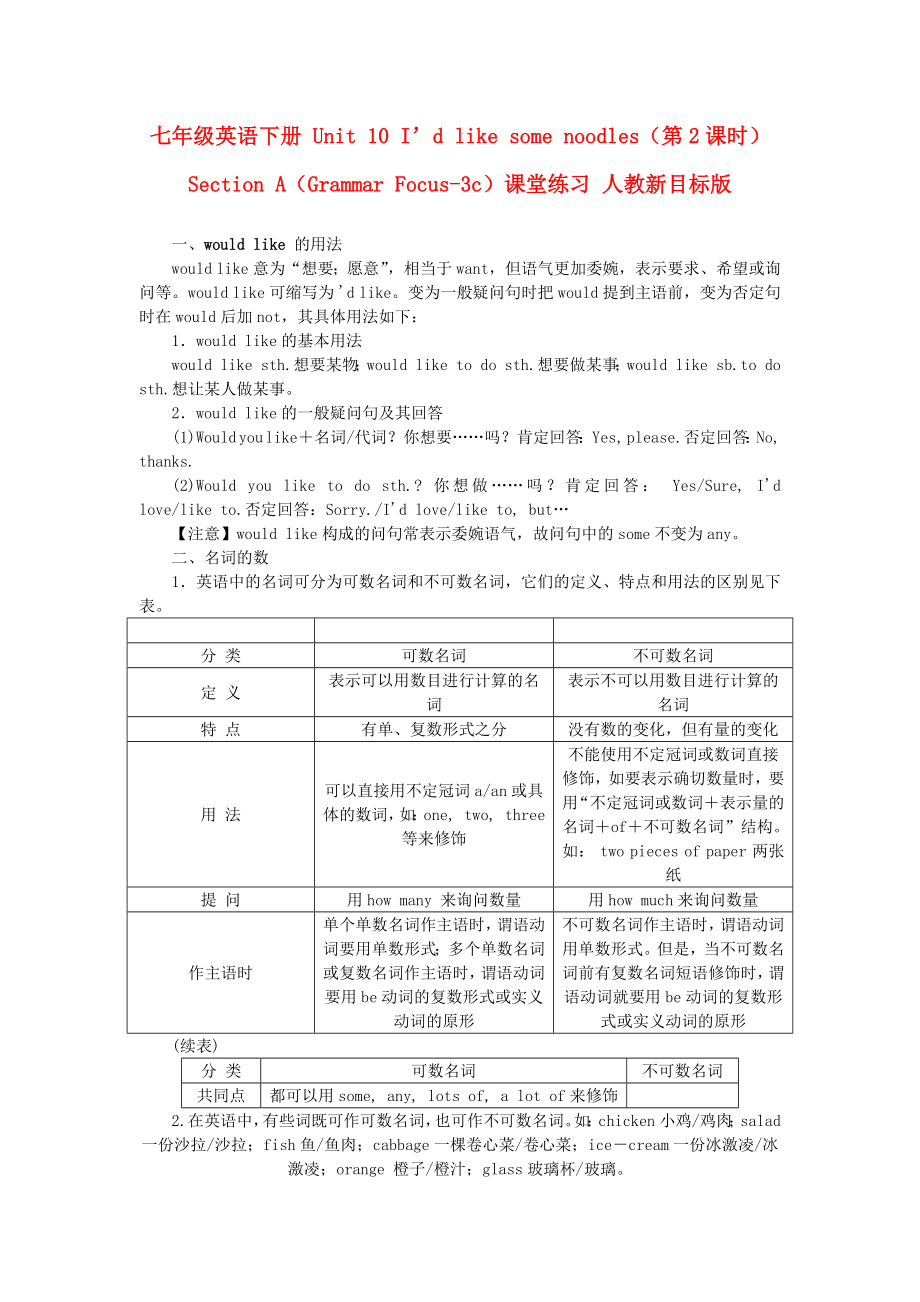《七年級(jí)英語(yǔ)下冊(cè) Unit 10 I’d like some noodles(第2課時(shí))Section A(Grammar Focus-3c)課堂練習(xí) 人教新目標(biāo)版》由會(huì)員分享���,可在線閱讀���,更多相關(guān)《七年級(jí)英語(yǔ)下冊(cè) Unit 10 I’d like some noodles(第2課時(shí))Section A(Grammar Focus-3c)課堂練習(xí) 人教新目標(biāo)版(3頁(yè)珍藏版)》請(qǐng)?jiān)谘b配圖網(wǎng)上搜索。
1���、七年級(jí)英語(yǔ)下冊(cè) Unit 10 I’d like some noodles(第2課時(shí))Section A(Grammar Focus-3c)課堂練習(xí) 人教新目標(biāo)版
一���、would like 的用法
would like 意為“想要;愿意”���,相當(dāng)于want���,但語(yǔ)氣更加委婉,表示要求���、希望或詢問(wèn)等���。would like 可縮寫為 'd like���。變?yōu)橐话阋蓡?wèn)句時(shí)把would提到主語(yǔ)前,變?yōu)榉穸ň鋾r(shí)在would后加not���,其具體用法如下:
1.would like的基本用法
would like sth.想要某物���;would like to do sth.想要做某事;would like
2���、 sb.to do sth.想讓某人做某事���。
2.would like的一般疑問(wèn)句及其回答
(1)Would you like+名詞/代詞?你想要……嗎���?肯定回答: Yes, please.否定回答:No, thanks.
(2)Would you like to do sth.? 你想做……嗎���?肯定回答: Yes/Sure, I'd love/like to.否定回答:Sorry./I'd love/like to, but…
【注意】would like構(gòu)成的問(wèn)句常表示委婉語(yǔ)氣,故問(wèn)句中的some不變?yōu)閍ny���。
二���、名詞的數(shù)
1.英語(yǔ)中的名詞可分為可數(shù)名詞和不可數(shù)名詞���,它們的定
3、義���、特點(diǎn)和用法的區(qū)別見(jiàn)下表。
分 類
可數(shù)名詞
不可數(shù)名詞
定 義
表示可以用數(shù)目進(jìn)行計(jì)算的名詞
表示不可以用數(shù)目進(jìn)行計(jì)算的名詞
特 點(diǎn)
有單���、復(fù)數(shù)形式之分
沒(méi)有數(shù)的變化���,但有量的變化
用 法
可以直接用不定冠詞a/an或具體的數(shù)詞,如:one, two, three等來(lái)修飾
不能使用不定冠詞或數(shù)詞直接修飾���,如要表示確切數(shù)量時(shí)���,要用“不定冠詞或數(shù)詞+表示量的名詞+of+不可數(shù)名詞”結(jié)構(gòu)。如: two pieces of paper 兩張紙
提 問(wèn)
用how many 來(lái)詢問(wèn)數(shù)量
用how much來(lái)詢問(wèn)數(shù)量
作主語(yǔ)時(shí)
單個(gè)單數(shù)名詞作主語(yǔ)時(shí)���,謂語(yǔ)動(dòng)詞
4���、要用單數(shù)形式���;多個(gè)單數(shù)名詞或復(fù)數(shù)名詞作主語(yǔ)時(shí),謂語(yǔ)動(dòng)詞要用be動(dòng)詞的復(fù)數(shù)形式或?qū)嵙x動(dòng)詞的原形
不可數(shù)名詞作主語(yǔ)時(shí)���,謂語(yǔ)動(dòng)詞用單數(shù)形式���。但是,當(dāng)不可數(shù)名詞前有復(fù)數(shù)名詞短語(yǔ)修飾時(shí)���,謂語(yǔ)動(dòng)詞就要用be動(dòng)詞的復(fù)數(shù)形式或?qū)嵙x動(dòng)詞的原形
(續(xù)表)
分 類
可數(shù)名詞
不可數(shù)名詞
共同點(diǎn)
都可以用some, any, lots of, a lot of來(lái)修飾
2.在英語(yǔ)中���,有些詞既可作可數(shù)名詞,也可作不可數(shù)名詞���。如:chicken小雞/雞肉���;salad 一份沙拉/沙拉;fish魚/魚肉���;cabbage一棵卷心菜/卷心菜���;ice-cream一份冰激凌/冰激凌���;orange 橙子/橙汁;gla
5���、ss玻璃杯/玻璃���。
Ⅰ.用括號(hào)內(nèi)所給單詞的適當(dāng)形式填空。
1.My mother knows all the__sizes__(size) of my clothing.
2.She'd like mutton and __tomato__(tomato) noodles.
3.My parents would like to __have__(have) a long talk with me.
4.I'd like you__to__help__(help) this little girl with her homework.
5.A large bowl of vegeta
6���、bles__is__(be) on the table.
Ⅱ.按要求完成下列句子���。
1.Do you want any potatoes���?(改為同義句)
__Would__you__like__some__potatoes���?__
2.He'd like some tomatoes.(改為否定句)
__He__wouldn't__like__any__tomatoes.__
3.He finds some mutton in the fridge.(改為一般疑問(wèn)句)
__Does__he__find__any__mutton__in__the__fridge?__
4.I'd l
7���、ike to go__to__the__movies.(對(duì)畫線部分提問(wèn))
__What__would__you__like__to__do���?__
5.There is an apple and a strawberry on the table.(改為復(fù)數(shù)句)
__There__are__some__apples__and__strawberries__on__the__table.__
Ⅲ.單項(xiàng)選擇���。
(C)1.Mr.Black gives us ________ to eat in the morning.
A.a(chǎn) bread B.many breads
C.some b
8、read D.a(chǎn)ny bread
(A)2.There are ________ juice on the table.
A.two glasses of
B.two glass of
C.two glasses
D.two glass
(A)3.Mike likes to eat ________ for lunch.
A.some chicken
B.some chickens
C.a(chǎn) chicken
D.many chicken
(C)4.Alice doesn't have ________ bananas, but she has ______
9���、__ apples.
A.some; any
B.some; some
C.a(chǎn)ny; some
D.a(chǎn)ny; any
(A)5.—Tom, would you like to train(訓(xùn)練) our football team?
—________.
A.Sure, I'd like to
B.You're wele
C.That's OK
D.Not at all
Ⅳ.選詞填空���。
閱讀短文,從方框中選擇適當(dāng)?shù)脑~并用其正確形式填空���,使短文通順���、意思完整。每詞限用一次���。
buy delicious difference food like
m
10���、ake meat noodle supermarket usual
I like eating rice,__1__���, strawberries, ice-cream, hamburgers and so on.But my favorite __2__ is dumplings.Every Sunday, my mother __3__ many dumplings for me.If she has no time, I'll go to the __4__ to __5__ some.Dumplings look __6__ white boats.They are very __7_
11���、_.On my birthday, I __8__ help my mother make a lot of dumplings.Do you know the reason? Because I often ask some friends to eat them with me.There are__9__ kinds of vegetables and__10__ in them.All of my friends like to eat them very much.
1.__noodles__ 2.__food__ 3.__makes__
4.__supermarket__ 5.__buy__ 6.__like__
7.__delicious__ 8.__usually__ 9.__different__
10.__meat__
 七年級(jí)英語(yǔ)下冊(cè) Unit 10 I’d like some noodles(第2課時(shí))Section A(Grammar Focus-3c)課堂練習(xí) 人教新目標(biāo)版
七年級(jí)英語(yǔ)下冊(cè) Unit 10 I’d like some noodles(第2課時(shí))Section A(Grammar Focus-3c)課堂練習(xí) 人教新目標(biāo)版

